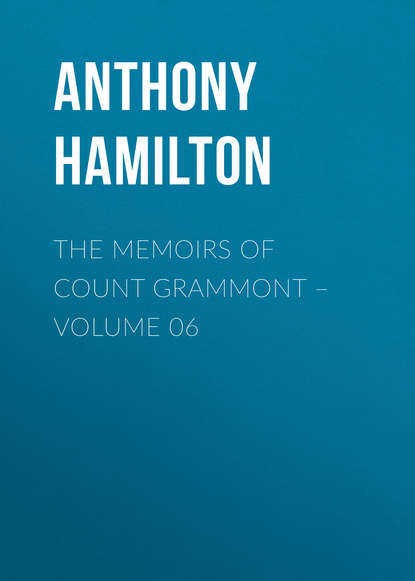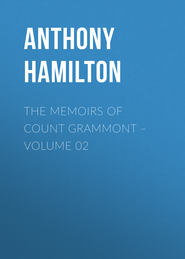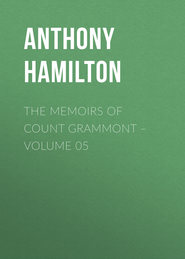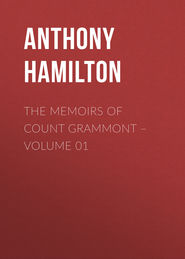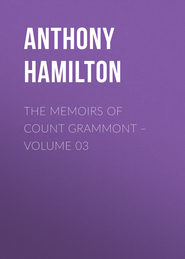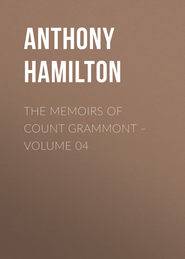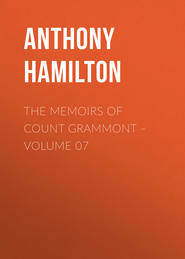По всем вопросам обращайтесь на: info@litportal.ru
(©) 2003-2024.
✖
The Memoirs of Count Grammont – Volume 06
Настройки чтения
Размер шрифта
Высота строк
Поля
But, instead of approaching nearer the court, he retreated into one of the most obscure corners of the city: where, again changing both his name and his dress, in order to act a new part, he caused bills to be dispersed, giving notice of "The recent arrival of a famous German doctor, who, by long application and experience, had found out wonderful secrets, and infallible remedies."
[Bishop Burnet confirms this account. – "Being under an unlucky accident, which obliged him to keep out of the way, he disguised himself so, that his nearest friends could not have known him, and set up in Tower Street for an Italian mountebank, where he practised physic for some weeks, not without success. In his latter years he read books of history more. He took pleasure to disguise himself as a porter, or as a beggar; sometimes to follow some mean amours, which, for the variety of them, he affected. At other times, merely for diversion, he would go about in odd shapes; in which he acted his part so naturally, that even those who were in the secret, and saw him in these shapes, could perceive nothing by which he might be discovered." – Burnet's Life of Rochester, ed. 1774, p. 14.]
His secrets consisted in knowing what was past, and foretelling what was to come, by the assistance of astrology: and the virtue of his remedies principally consisted in giving present relief to unfortunate young women in all manner of diseases, and all kinds of accidents incident to the fair sex, either from too unbounded charity to their neighbours, or too great indulgence to themselves.
His first practice being confined to his neighbourhood, was not very considerable; but his reputation soon extending to the other end of the town, there presently flocked to him the women attending on the court, next, the chamber-maids of ladies of quality, who, upon the wonders they related concerning the German doctor, were soon followed by some of their mistresses.
Among all the compositions of a ludicrous and satirical kind, there never existed any that could be compared to those of Lord Rochester, either for humour, fire, or wit; but, of all his works, the most ingenious and entertaining is that which contains a detail of the intrigues and adventures in which he was engaged while he professed medicine and astrology in the suburbs of London.
The fair Jennings was very near getting a place in this collection; but the adventure that prevented her from it, did not, however, conceal from the public her intention of paying a visit to the German doctor.
The first chamber-maids that consulted him were only those of the maids of honour; who had numberless questions to ask, and not a few doubts to be resolved, both upon their own and their mistresses' accounts. Notwithstanding their disguise, he recognised some of them, particularly Miss Temple's and Miss Price's maids, and her whom Miss Hobart had lately discarded: these creatures all returned either filled with wonder and amazement, or petrified with terror and fear. Miss Temple's chamber-maid deposed that he assured her she would have the small-pox, and her mistress the great, within two months at farthest, if her aforesaid mistress did not guard against a man in woman's clothes. Miss Price's woman affirmed that, without knowing her, and only looking in her hand, he told her at first sight that, according to the course of the stars, he perceived that she was in the service of some good-natured lady, who had no other fault than loving wine and men. In short, every one of them, struck with some particular circumstance relating to their own private affairs, had either alarmed or diverted their mistresses with the account, not failing, according to custom, to embellish the truth, in order to enhance the wonder.
Miss Price, relating these circumstances one day to her new friend, the devil immediately tempted her to go in person, and see what sort of a creature this new magician was. This enterprise was certainly very rash; but nothing was too rash for Miss Jennings, who was of opinion that a woman might despise appearances, provided she was in reality virtuous. Miss Price was all compliance, and thus having fixed upon this glorious resolution, they only thought of the proper means of putting it into execution.
It was very difficult for Miss Jennings to disguise herself, on account of her excessive fair and bright complexion, and of something particular in her air and manner: however, after having well considered the matter the best disguise they could think of was to dress themselves like orange girls.
[These frolics appear to have been not unfrequent with persons of high rank at this period. In a letter from Mr. Henshaw to Sir Robert Paston, afterwards Earl of Yarmouth, dated October 13, 1670, we have the following account: "Last week, there being a faire neare Audley-end, the queen, the Dutchess of Richmond, and the Dutchess of Buckingham, had a frolick to disguise themselves like country lasses, to red petticoats, wastcotes, &c., and so goe see the faire. Sir Barnard Gascoign, on a cart jade, rode before the queen; another stranger before the Dutchess of Buckingham; and Mr. Roper before Richmond. They had all so overdone it in their disguise, and looked so much more like antiques than country volk, that, as soon as they came to the faire, the people began to goe after them; but the queen going to a booth, to buy a pair of yellow stockings for her sweet hart, and Sir Bernard asking for a pair of gloves sticht with blew, for his sweet hart, they were soon, by their gebrish, found to be strangers, which drew a bigger flock about them. One amongst them had seen the queen at dinner, knew her, and was proud of her knowledge. This soon brought all the faire into a crowd to stare at the queen. Being thus discovered, they, as soon as they could, got to their horses; but as many of the faire as had horses got up, with their wives, children, sweet harts, or neighbours, behind them, to get as much gape as they could, till they brought them to the court gate. Thus, by ill conduct, was a merry frolick turned into a penance." – I've's Select Papers, p. 39.
Bishop Burnet says, "at this time, (1668) the court fell into much extravagance in masquerading: both the king and queen, all the court, went about masked, and came into houses unknown, and danced there, with a great deal of wild frolic. In all this people were so disguised, that, without being in the secret, none could distinguish them. They were carried about in hackney chairs. Once the queen's chairmen, not knowing who she was, went from her. So she was alone, and was much disturbed, and came to Whitehall in a hackney coach; some say in a cart." – Burnet's History, vol. i., p. 368.]
This was no sooner resolved upon, but it was put in execution they attired themselves alike, and, taking each a basket of oranges under their arms, they embarked in a hackney coach, and committed themselves to fortune, without any other escort than their own caprice and indiscretion.
The duchess was gone to the play with her sister: Miss Jennings had excused herself under pretence of indisposition she was overjoyed at the happy commencement of their adventure; for they had disguised themselves, had crossed the Park, and taken their hackney coach at Whitehall gate, without the least accident. They mutually congratulated each other upon it, and Miss Price, taking a beginning so prosperous as a good omen of their success, asked her companion what they were to do at the fortune-teller's, and what they should propose to him.
Miss Jennings told her that, for her part, curiosity was her principal inducement for going thither; that, however, she was resolved to ask him, without naming any person, why a man, who was in love with a handsome young lady, was not urgent to marry her, since this was in his power to do, and by so doing he would have an opportunity of gratifying his desires. Miss Price told her, smiling, that, without going to the astrologer, nothing was more easy than to explain the enigma, as she herself had almost given her a solution of it in the narrative of the Duchess of Cleveland's adventures.
Having by this time nearly arrived at the playhouse, Miss Price, after a moment's reflection, said, that since fortune favoured them, a fair opportunity was now offered to signalize their courage, which was to go and sell oranges in the very playhouse, in the sight of the duchess and the whole court. The proposal being worthy of the sentiments of the one, and of the vivacity of the other, they immediately alighted, paid off their hack, and, running through the midst of an immense number of coaches, with great difficulty they reached the playhouse door. Sidney, more handsome than the beautiful Adonis, and dressed more gay than usual, alighted just then from his coach: Miss Price went boldly up to him, as he was adjusting his curls; but he was too much occupied with his own dear self to attend to anything else, and so passed on without deigning to give her an answer. Killegrew came next, and the fair Jennings, partly encouraged by the other's pertness, advanced towards him, and offered him her basket, whilst Price, more used to the language, desired him to buy her fine oranges. "Not now," said he, looking at them with attention; "but if thou wilt to-morrow morning bring this young girl to my lodgings, I will make it worth all the oranges in London to thee" and while he thus spoke to the one he chucked the other under the chin, examining her bosom. These familiarities making little Jennings forget the part she was acting, after having pushed him away with all the violence she was able, she told him with indignation that it was very insolent to dare – "Ha! ha!" said he, "here's a rarity indeed! a young w – , who, the better to sell her goods, sets up for virtue, and pretends innocence!"
Price immediately perceived that nothing could be gained by continuing any longer in so dangerous a place; and, taking her companion under the arm, she dragged her away, while she was still in emotion at the insult that had been offered to her.
Miss Jennings, resolving to sell no more oranges on these terms, was tempted to return, without accomplishing the other adventure; but Price having represented to her the disgrace of such cowardly behaviour, more particularly after having before manifested so much resolution, she consented to go and pay the astrologer a short visit, so as they might be enabled to regain the palace before the play was ended.
They had one of the doctor's bills for a direction, but there was no occasion for it; for the driver of the coach they had taken told them he knew very well the place they wanted, for he had already carried above an hundred persons to the German doctor's: they were within half a street of his house, when fortune thought proper to play them a trick.
Brounker had dined by chance with a merchant in that part of the city, and just as he was going away they ordered their coach to stop, as ill-luck would have it, just opposite to him. Two orange girls in a hackney coach, one of whom appeared to have a very pretty face, immediately drew his attention; besides, he had a natural curiosity for such objects.
[Gentleman of the chamber to the Duke of York, and brother to Lord Viscount Brounker, president of the royal society. Lord Clarendon imputes to him the cause of the great sea-fight, in 1665, not being so well improved as it might have been, and adds, "nor did the duke come to hear of it till some years after, when Mr. Brounker's ill course of life, and his abominable nature, had rendered him so odious, that it was taken notice of in parliament, and, upon examination, found to be true, as is here related; upon which he was expelled the house of commons, whereof he was a; member, as an infamous person, though his friend Coventry adhered to him, and used many indirect acts to have protected him, and afterwards procured him to have more countenance from the king than most men thought he deserved; being a person, throughout his whole life, never notorious for anything but the highest degree of impudence, and stooping to the most infamous offices, and playing very well at chess, which preferred him more than the most virtuous qualities could have done." – Continuation of Clarendon's Life, p. 270.]
Of all the men at court, he had the least regard for the fair sex, and the least attention to their reputation: he was not young, nor was his person agreeable; however, with a great deal of wit he had a violent passion for women. He did himself justice respecting his own merit; and, being persuaded that he could only succeed with those who were desirous of having his money, he was at open war with all the rest. He had a little country-house four or five miles from London always well stocked with girls: in other respects he was a very honest man, and the best chess-player in England.
Price, alarmed at being thus closely examined by the most dangerous enemy they could encounter, turned her head the other way, bid her companion do the same, and told the coachman to drive on. Brounker followed them unperceived on foot; and the coach having stopped twenty or thirty yards farther up the street, they alighted. He was just behind them, and formed the same judgment of them which a man much more charitable to the sex must unavoidably have done, concluding that Miss Jennings was a young courtesan upon the look-out, and that Miss Price was the mother-abbess. He was, however, surprised to see them have much better shoes and stockings than women of that rank generally wear, and that the little orange girl, in getting out of a very high coach, showed one of the handsomest legs he had ever seen: but as all this was no obstruction to his designs, he resolved to purchase her at any rate, in order to place her in his seraglio.
He came up to them, as they were giving their baskets in guard to the coachman, with orders to wait for them exactly in that place. Brounker immediately pushed in between them: as soon as they saw him, they gave themselves up for lost; but he, without taking the least notice of their surprise, took Price aside with one hand, and his purse with the other, and began immediately to enter upon business, but was astonished to perceive that she turned away her face, without either answering or looking at him: As this conduct appeared to him unnatural, he stared her full in the face, notwithstanding all her endeavours to prevent him: he did the same to the other: and immediately recognised them, but determined to conceal his discovery.
The old fox possessed a wonderful command of temper on such occasions, and having teazed them a little longer to remove all suspicions he quitted them, telling Price; "That she was a great fool to refuse his offers, and that her girl would not, perhaps, get so much in a year, as she might with him in one day; that the times were greatly changed, since the queen's and the duchess's maids of honour forestalled the market, and were to be had cheaper than the town ladies." Upon this he went back to his coach, whilst they blessed themselves, returning heaven their most hearty thanks for having escaped this danger without being discovered.
Brounker, on the other hand, would not have taken a thousand guineas for this rencounter: he blessed the Lord that he had not alarmed them to such a degree as to frustrate their intention; for he made no doubt but Miss Price had managed some intrigue for Miss Jennings: he therefore immediately concluded, that at present it would be improper to make known his discovery, which would have answered no other end but to have overwhelmed them with confusion.
Upon this account, although Jermyn was one of his best friends, he felt a secret joy in not having prevented his being made a cuckold, before his marriage; and the apprehension he was in of preserving him from that accident, was his sole reason for quitting them with the precautions aforementioned.
Whilst they were under these alarms, their coachman was engaged in a squabble with some blackguard boys, who had gathered round his coach in order to steal the oranges: from words they came to blows: the two nymphs saw the commencement of the fray as they were returning to the coach, after having abandoned the design of going to the fortuneteller's. Their coachman being a man of spirit, it was with great difficulty they could persuade him to leave their oranges to the mob, that they might get off without any further disturbance: having thus regained their hack, after a thousand frights, and after having received an abundant share of the most low and infamous abuse applied to them during the fracas, they at length reached St. James's, vowing never more to go after fortune-tellers, through so many dangers, terrors, and alarms, as they had lately undergone.
Brounker, who, from the indifferent opinion he entertained of the fair sex, would have staked his life that Miss Jennings did not return from this expedition in the same condition she went, kept his thoughts, however, a profound secret; since it would have afforded him the highest satisfaction to have seen the all-fortunate Jermyn marry a little street-walker, who pretended to pass for a pattern of chastity, that he might, the day after his marriage, congratulate him upon his virtuous spouse; but heaven was not disposed to afford him that satisfaction, as will appear in the sequel of these memoirs.
Miss Hamilton was in the country, as we before mentioned, at a relation's: the Chevalier de Grammont bore this short absence of hers with great uneasiness, since she would not allow him permission to visit her there, upon any pretence whatever; but play, which was favourable to him, was no small relief to his extreme impatience.
Miss Hamilton, however, at last returned. Mrs. Wetenhall (for that was the name of her relation) would by all means wait upon her to London, in appearance out of politeness; for ceremony, carried beyond all bearing, is the grand characteristic of country gentry: yet this mark of civility was only a pretence, to obtain a peevish husband's consent to his wife's journey to town. Perhaps he would have done himself the honour of conducting Miss Hamilton up to London, had he not been employed in writing some remarks upon the ecclesiastical history, a work in which he had long been engaged: the ladies were more civil than to interrupt him in his undertaking, and besides, it would entirely have disconcerted all Mrs. Wetenhall's schemes.
This lady was what may be properly called a beauty, entirely English, made up of lilies and roses, of snow and milk, as to colour; and of wax, with respect to the arms, hands, neck, and feet, but all this without either animation or air; her face was uncommonly pretty; but there was no variety, no change of countenance in it: one would have thought she took it in the morning out of a case, in order to put it up again at night, without using it in the smallest degree in the daytime. What can I say of her! nature had formed her a baby from her infancy, and a baby remained till death the fair Mrs. Wetenhall. Her husband had been destined for the church; but his elder brother dying just at the time he had gone through his studies of divinity, instead of taking orders, he came to England, and took to wife Miss Bedingfield, the lady of whom we are now speaking.
His person was not disagreeable, but he had a serious contemplative air, very apt to occasion disgust: as for the rest, she might boast of having one of the greatest theologists in the kingdom for her husband: he was all day poring over his books, and went to bed soon, in order to rise early; so that his wife found him snoring when she came to bed, and when he arose he left her there sound asleep: his conversation at table would have been very brisk, if Mrs. Wetenhall had been as great a proficient in divinity, or as great a lover of controversy, as he was; but being neither learned in the former, nor desirous of the latter, silence reigned at their table, as absolutely as at a refectory.
She had often expressed a great desire to see London; but though they were only distant a very short day's journey from it, she had never been able to satisfy her curiosity: it was not therefore without reason, that she grew weary of the life she was forced to lead at Peckham. The melancholy retired situation of the place was to her insupportable; and as she had the folly, incident to many other women, of believing sterility to be a kind of reproach, she was very much hurt to see that she might fall under that suspicion; for she was persuaded, that although heaven had denied her children, she nevertheless had all the necessary requisites on her part, if it had been the will of the Lord. This had occasioned her to make some reflections, and then to reason upon those reflections; as for instance, that since her husband chose rather to devote himself to his studies, than to the duties of matrimony, to turn over musty old books, rather than attend to the attractions of beauty, and to gratify his own pleasures, rather than those of his wife, it might be permitted her to relieve some necessitous lover, in neighbourly charity, provided she could do it conscientiously, and to direct her inclinations in so just a, manner, that the evil spirit should have no concern in it. Mr. Wetenhall, a zealous partisan for the doctrine of the casuists, would not perhaps have approved of these decisions; but he was not consulted.
The greatest misfortune was, that neither solitary Peckham nor its sterile neighbourhood, presented any expedients, either for the execution of the afore-mentioned design, or for the relief of poor Mrs. Wetenhall: she was visibly pining away, when, through fear of dying either with solitude or of want, she had recourse to Miss Hamilton's commiseration.
Their first acquaintance was formed at Paris, whither Mr. Wetenhall had taken his wife half a year after they were married, on a journey thither to buy books: Miss Hamilton, who from that very time greatly pitied her, consented to pass some time in the country with her, in hopes by that visit to deliver her, for a short time at least, out of her captivity; which project succeeded according to her wish.
The Chevalier de Grammont, being informed of the day on which they were to arrive, borne on the wings of love and impatience, had engaged George Hamilton to go with him, and meet them some miles out of London. The equipage he had prepared for the purpose, corresponded with his usual magnificence; and on such an occasion, we may reasonably suppose he had not neglected his person: however, with all his impatience, he checked the ardour of the coachman, through fear of accidents, rightly judging that upon a road prudence is preferable to eagerness. The ladies at length appeared, and Miss Hamilton, being in his eyes, ten or twelve times more handsome than before her departure from London, he would have purchased with his life so kind a reception as she gave her brother.
Mrs. Wetenhall had her share of the praises, which at this interview were liberally bestowed upon her beauty, for which her beauty was very thankful to those who did it so much honour; and as Hamilton regarded her with a tender attention, she regarded Hamilton as a man very well qualified for putting in execution the little projects she had concerted with her conscience.
As soon as she was in London, her head was almost turned, through an excess of contentment and felicity: everything appeared like enchantment to her in this superb city; more particularly, as in Paris she had never seen anything farther than the Rue Saint Jacques, and a few booksellers' shops. Miss Hamilton entertained her at her own house, and she was presented, admired, and well received at both courts.
The Chevalier de Grammont, whose gallantry and magnificence were inexhaustible, taking occasion, from this fair stranger's arrival, to exhibit his grandeur, nothing was to be seen but balls, concerts, plays, excursions by land and by water, splendid collations and sumptuous entertainments: Mrs. Wetenhall was transported with pleasures, of which the greatest part were entirely new to her; she was greatly delighted with all, except now and then at a play, when tragedy was acted, which she confessed she thought rather wearisome: she agreed, however, that the show was very interesting, when there were many people killed upon the stage, but thought the players were very fine handsome fellows, who were much better alive than dead.
Hamilton, upon the whole, was pretty well treated by her, if a man in love, who is never satisfied until the completion of his wishes, could confine himself within the bounds of moderation and reason: he used all his endeavours to determine her to put in execution the projects she had formed at Peckham: Mrs. Wetenhall, on the other hand, was much pleased with him. This is the Hamilton who served in the French army with distinction; he was both agreeable and handsome. All imaginable opportunities conspired to favour the establishment of an intimacy, whose commencement had been so brisk, that in all probability it would not languish for a conclusion; but the more he pressed her to it, the more her resolution began to fail, and regard for some scruples, which she had not well weighed, kept her in suspense: there was reason to believe that a little perseverance would have removed these obstacles; yet this at the present time was not attempted. Hamilton, not able to conceive what could prevent her from completing his happiness, since in his opinion the first and greatest difficulties of an amour were already overcome, with respect to the public, resolved to abandon her to her irresolutions, instead of endeavouring to conquer them by a more vigorous attack. It was not consistent with reason, to desist from an enterprise, where so many prospects of success presented themselves, for such inconsiderable obstacles; but he suffered himself to be intoxicated with chimeras and visions, which unseasonably cooled the vigour of his pursuit, and led him astray in another unprofitable undertaking.
[I apprehend he is the same George Hamilton already described, who married Miss Jennings, and not the author of this work, as Lord Orford supposes. In a letter from Arlington to Sir William Godolphin, dated September 7, 1671, it is said, "the Conde de Molina complains to us of certain levies Sir George Hamilton hath made in Ireland. The king hath always told him he had no express license for it; and I have told the Conde he must not find it strange that a gentleman who had been bred the king's page abroad, and losing his employment at home, for being a Roman Catholic, should have some more than ordinary connivance towards the making his fortune abroad by the countenance of his friends and relations in Ireland: and yet take the matter in the worst sense he could give, it would not amount to the breach of any article betwixt the king my master and the court of Spain." – Arlington's letters, vol. ii., p. 332. In a letter from the same nobleman to Lord Sandwich, written about October, 1667, we find the cause of Sir George Hamilton's entering into the French service "Concerning the reformadoes of, the guards of horse, his majesty thought fit, the other day, to have them dismissed, according to his promise, made to the parliament at the last session. Mr. Hamilton had a secret overture made him, that he, with those men, should be welcome into the French service; his majesty, at their dismissal, having declared they should have leave to go abroad whither they pleased. They accepted of Mr. Hamilton's offer to carry them into France. "Arlington's Letters," vol. i., p. 185. Lodge, in his Peerage of Ireland, says, Sir George Hamilton died in 1667, which, from the first extract above, appears to be erroneous. He has evidently confounded the father and son; the former of whom was the person who died in 1667.]
I know not whether poor Wetenhall took the blame upon herself; but it is certain, she was extremely mortified upon it. Soon after being obliged to return to her cabbages and turkeys at Peckham, she had almost gone distracted: that residence appeared a thousand times more dreadful to her, since she had been initiated into the amusements of London; but as the queen was to set out within a month for Tunbridge Wells, she was obliged to yield to necessity, and return to the philosopher, Wetenhall, with the consolation of having engaged Miss Hamilton to come and live at her house, which was within ten or twelve miles of Tunbridge, as long as the court remained there.
Miss Hamilton promised not to abandon her in her retirement, and further engaged to bring the Chevalier de Grammont along with her, whose humour and conversation extremely delighted her. The Chevalier de Grammont, who on all occasions started agreeable raillery, engaged on his part to bring George Hamilton, which words overwhelmed her with blushes. The court set out soon after to pass about two months in the place of all Europe the most rural and simple, and yet, at the same time, the most entertaining and agreeable. Tunbridge is the same distance from London, that Fontainebleau is from Paris, and is, at the season, the general rendezvous of all the gay and handsome of both sexes. The company, though always numerous, is always select: since those who repair thither for diversion, ever exceed the number of those who go thither for health. Everything there breathes mirth and pleasure: constraint is banished, familiarity is established upon the first acquaintance, and joy and pleasure are the sole sovereigns of the place.
The company are accommodated with lodgings in little, clean, and convenient habitations, that lie straggling and separated from each other, a mile and a half all round the Wells, where the company meet in the morning: this place consists of a long walk, shaded by spreading trees, under which they walk while they are drinking the waters: on one side of this walk is a long row of shops, plentifully stocked with all manner of toys, lace, gloves, stockings, and where there is raffling, as at Paris, in the Foire de Saint Germain: on the other side of the walk is the market; and, as it is the custom here for every person to buy their own provisions, care is taken that nothing offensive appears on the stalls. Here young, fair, fresh-coloured country girls, with clean linen, small straw hats, and neat shoes and stockings, sell game, vegetables, flowers and fruit: here one may live as one pleases: here is, likewise, deep play, and no want of amorous intrigues. As soon as the evening comes, every one quits his little palace to assemble at the bowling-green, where, in the open air, those who choose, dance upon a turf more soft and smooth than the finest carpet in the world,
Lord Muskerry had, within two or three short miles of Tunbridge, a very handsome seat called Summer-hill: Miss Hamilton, after having spent eight or ten days at Peckham, could not excuse herself from passing the remainder of the season at his house; and, having obtained leave of Mr. Wetenhall, that his lady should accompany her, they left the melancholy residence of Peckham, and its tiresome master, and fixed their little court at Summer-hill.
They went every day to court, or the court came to them. The queen even surpassed her usual attentions in inventing and supporting entertainments: she endeavoured to increase the natural ease and freedom of Tunbridge, by dispensing with, rather than requiring, those ceremonies that were due to her presence; and, confining in the bottom of her heart that grief and uneasiness she could not overcome, she saw Miss Stewart triumphantly possess the affections of the king without manifesting the least uneasiness.
Never did love see his empire in a more flourishing condition than on this spot: those who were smitten before they came to it, felt a mighty augmentation of their flame; and those who seemed the least susceptible of love, laid aside their natural ferocity, to act in a new character. For the truth of the latter, we shall only relate the change which soon appeared in the conduct of Prince Rupert.
[Lord Orford's contrast to this character of Prince Rupert is too just to be here omitted. "Born with the taste of an uncle whom his sword was not fortunate in defending, Prince Rupert was fond of those sciences which soften and adorn a hero's private hours, and knew how to mix them with his minutes of amusement, without dedicating his life to their pursuit, like us, who, wanting capacity for momentous views, make serious study of what is only the transitory occupation of a genius. Had the court of the first Charles been peaceful, how agreeably had the prince's congenial propensity flattered and confirmed the inclination of his uncle! How the muse of arts would have repaid the patronage of the monarch, when, for his first artist, she would have presented him with his nephew! How different a figure did the same prince make in a reign of dissimilar complexion! The philosophic warrior, who could relax himself into the ornament of a refined court, was thought a savage mechanic, when courtiers were only voluptuous wits. Let me transcribe a picture of Prince Rupert, drawn by a man who was far from having the least portion of wit in that age, who was superior to its indelicacy, and who yet was so overborne by its prejudices, that he had the complaisance to ridicule virtue, merit, talents. – But Prince Rupert, alas! was an awkward lover!" Lord Orford here inserts the character in the text, and then adds, "What pity that we, who wish to transmit this prince's resemblance to posterity on a fairer canvas, have none of these inimitable colours to efface the harsher likeness! We can but oppose facts to wit, truth to satire. – How unequal the pencils! yet what these lines cannot do they may suggest: they may induce the reader to reflect, that if the prince was defective in the transient varnish of a court, he at least was adorned by the arts with that polish which alone can make a court attract the attention of subsequent ages." – Catalogue of Engravers, p 135, 8vo ed.]
He was brave and courageous, even to rashness; but cross-grained and incorrigibly obstinate: his genius was fertile in mathematical experiments, and he possessed some knowledge of chemistry: he was polite even to excess, unseasonably; but haughty, and even brutal, when he ought to have been gentle and courteous: he was tall, and his manners were ungracious: he had a dry hard-favoured visage, and a stern look, even when he wished to please; but, when he was out of humour, he was the true picture of reproof.
The queen had sent for the players, either that there might be no intermission in the diversions of the place, or, perhaps, to retort upon Miss Stewart, by the presence of Nell Gwyn, part of the uneasiness she felt from hers. Prince Rupert found charms in the person of another player called Hughes, who brought down and greatly subdued his natural fierceness.





